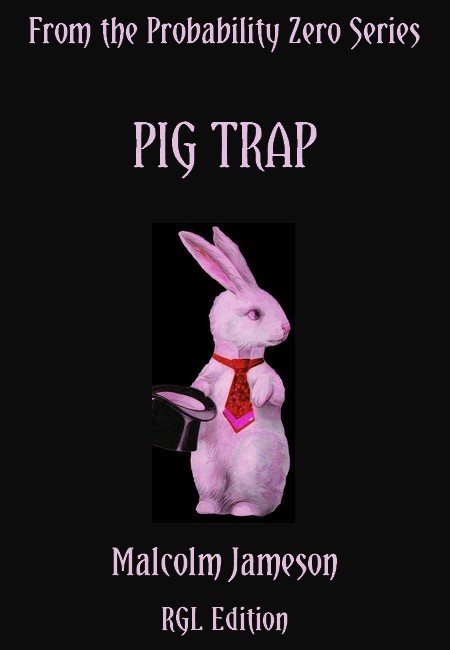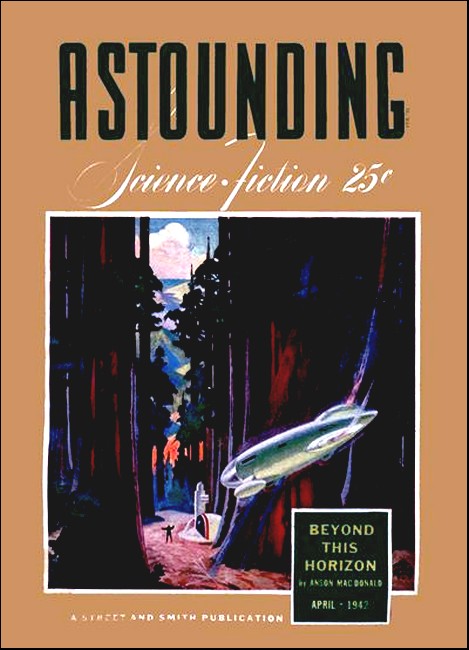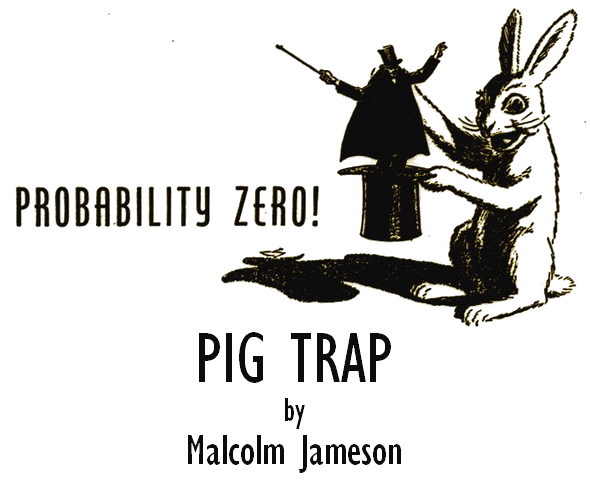
RGL e-Book Cover©
Roy Glashan's Library
Non sibi sed omnibus
Go to Home Page
This work is out of copyright in countries with a copyright
period of 70 years or less, after the year of the author's death.
If it is under copyright in your country of residence,
do not download or redistribute this file.
Original content added by RGL (e.g., introductions, notes,
RGL covers) is proprietary and protected by copyright.

RGL e-Book Cover©


Astounding Science-Fiction, April 1942, with "Pig Trap"
IN April 1942 Astounding Science-Fiction launched an open-ended series of "tall stories" under the general title "Probability Zero!" Writers were invited to submit contributions as entries in a competition, with prize money going to the first-, second- and third-placed stories each month.
The first three items published in the new series were: "Some Curious Effects of Time Travel," by Sprague de Camp; "Pig Trap," by Malcolm Jameson; and "Time Pussy," by George E. Dale.
Following the third item, the Editor printed the following description of the new series:
... The little items preceding were concocted, of course, by a sound trio of first-class, professional liars. In a length of this sort—some five hundred to seven hundred and fifty words—I think that there ought to be a number of excellent amateur liars, though. There may or may not be a "Probability Zero" department next month; the succeeding issue, however, will certainly have one—one concocted by amateurs and professionals alike. This month's supply of examples were bought at our standard space-rates; hereafter "Probability Zero" will be conducted as an open contest, wherein anyone equipped with a good, round prevarication is welcome. Readers will be invited to vote for the best of those published; the author of the winner will get twenty dollars, second place acquires ten, and third gets our check for five. Checks will be mailed as soon as the issue is decided.
To define the essence of the thing: We want science-fictional masterpieces that sound almost possible, but which are, as the department title states, "Probability Zero"—impossible by reason of known scientific law or by definition. They must be typed, double-spaced, and on one side of the usual size typewriter paper.
The old gag about truth being stranger than fiction is founded soundly; many an actual truth is highly implausible. We're looking for the exact reverse-something that's absolutely untrue, but highly plausible sounding.
For instance, it's a fact that a powerful jet of air—a real, roaring blast of air—will not blow a ball away; it will hold even a solid, fairly dense ball like a billiard ball supported in midair, pulling it back into the hardest, fastest part of the air-blast if it tries to waver out. That is obviously implausible; it happens to be true. It is also true that if you have a rope or chain running rapidly over two pulleys, with a considerable amount of slack in the chain, you can bend the chain's course into a loop—and have the loop stay there after removing the original deflecting force. The rapidly-moving chain will faithfully trace a course around the obstacle long after it has been removed, following a complicated S-course, even though under considerable tension. That's a rather implausible fact.
If facts can be that implausible, a good plausible lie should be fairly easy.
Click here to access a detailed bibliography of the Probability Zero! series in the Internet Speculative Fiction Database.
—Roy Glashan, 30 March 2022

SOMEONE had just finished a yarn about the bitter cold on the dark hemisphere of Uranus and the skittering, ghostly animals there.
"The most elusive creature in the whole Solar System," remarked old Admiral Womstock casually, "is the Iapetan kangothru. Nobody ever has caught one."
"I thought they were about the same thing as a kangaroo," chirped up a young lieutenant on the staff of the chief of astronautics.
"They are—sort of," admitted the admiral, gazing blandly at the ceiling. There was a hushed pause as a couple of older officers exchanged solemn winks. The youngster had never been to Luna Club before and couldn't know that, while old Womstock knew everything, most of it had never happened.
"Yes," murmured the admiral, "elusive is the word. They are marsupials, of course, but slightly different from the terrestrial kind. You see, they have a very bizarre sort of pouch. Comer one and it promptly pops its head into the bag—"
"And then?" asked the subaltern eagerly.
"Well, it just goes on in—all of it. There's nothing left to catch."
The lieutenant blushed as a ripple of chuckles ran round the room. After that there was a pained silence for a moment until Bullard spoke up. Captain Bullard rarely had time to attend those bullfests, but tonight he was relaxed and in a reminiscent mood.
"Speaking of cold and elusive animals," he said, "I seem to remember running into both together. That was on Pluto when I was a fresh-caught ensign on the old Asia. You talk about cold—if Pluto was a tenth of a degree colder it wouldn't be there. It's that close to absolute zero. But about the vacuum hogs. We were down and stuck for long repairs and ran out of grub. The skipper said to go out and catch some—"
"Hold on, Bullard," interrupted Captain Hackleson, "vacuum hogs aren't fit to eat. I've tried 'em. When you've thawed them out all you have is filthy, stinking stuff like watery jelly."
"Sure," agreed Bullard, "that's because you shot 'em and gave 'em a chance to freeze. They freeze so instantly and so hard that all their molecules are disrupted—even the bones and teeth. You have to catch 'em alive and then pop 'em in the icebox and let 'em cook. If you don't keep 'em at room temperature so long they burn up, they roast nicely in the refrigerator. At that it is somewhere about three hundred degrees above their normal. There is no better meat anywhere. The ham from a nice, fat vacuum hog—"
"What makes them fat, Captain Bullard?" asked the subaltern. "I always thought Pluto was pretty barren."
"It is, youngster," the skipper of the Pollux. answered, "pretty, pretty barren—just smooth, solid helium, no sun, no light, no air, nothing. But they do get fat—and how."
"But, sir, if there is only vacuum—" persisted, the aide.
"Quite so," said Bullard hurriedly, "but look how much there is of it."
The chief of astronautics glared at his junior and gulped hard. At that point Bullard seemed to lose all interest. He was busy peeling the shuck from a Venusian cheroot.
"Is that all?" asked someone. "You said something about their elusiveness."
"Oh, yes—their elusiveness! I wouldn't go so far as to say they are as elusive as the admiral's kangothrus, but they are sufficiently so. They could outrun anything we had, except a bullet, and I have already explained why bullets won't do. First and last we must have spent thirty days trying to catch one by using roundups, nets, traps and everything else. But nothing worked. Then one day the skipper sent for me. He had been getting sorer and sorer. He says to me, 'Bullard, I want one of those pigs for supper tonight and I can't eat alibis.' Just like that. Well, it sorta put it up to me. When I was a kid I used to fall for that kind of stimulus."
Somebody snickered.
"Anyhow, I sat down and scratched my head. What was faster than a pig, but wouldn't hurt him? The only harmless thing I could think of was light, and all of us know that is plenty fast. Then I thought of light in connection with the temperature outside—if you can call it temperature when you have to read the bottommost graduation on the thermometer with a high-power lens and a vernier. But it was a good hunch. I doped out a way to catch those porkers alive. I was so sure of it I went right to the galley and told the chef to start heating plenty of water right away—"
"Now, now, Bullard," reproached Hackleson, "you just said they'd burn to a crisp at ordinary room temperatures. Now you propose to boil them. You can't have it both ways, you know—"
"I'll come to that. The hot water was for something else. After that I climbed to the conning tower and turned on the searchlight. It's virtually pitch-dark on Pluto, but the moment I cast around with the light, I saw pigs all over the place. They stopped dead in their tracks the instant the light hit 'em and never moved again."
"Looking at you, eh? Fascinated by the light, I suppose. Gad! Why didn't we think of that?" Hackleson was quite serious. He knew Pluto and had seen the hogs.
"Not at all," said Bullard evenly. "I turned out the light for a while, but when I turned it on again, they were still there, stuck like flies on fly paper. That was all I wanted to know. It confirmed my theory. I sent a party of bluejackets out—mostly for the hell of it, as I knew they couldn't bring 'em in. At least, unless they had cleavers and did some foot amputations."
"This gets thicker and thicker," observed old Admiral Womstock. "But go on."
"Cookie and I filled up a big thermos jug with boiling water, hoping it wouldn't freeze before we got to the pigs. It stayed liquid is all I can say, but even that passes for hot on Pluto. Just as I anticipated, when we reached the first pig we found all the sailors huddled around it, heaving and hauling, and from the contortions of the pig's snout I judged it to be grunting and squealing. But they couldn't pull it loose. It was not until I poured water on the ground on the side away from the ship that the animal came free."
"I am afraid I do not quite follow," said the admiral with a frown.
"Elementary, my dear admiral. Our searchlight made the pig cast a shadow—the first it had ever had—and the shadow promptly froze to the ground. As I said, it's cold out there. After that all we had to do was soften up the shadow, pry it loose, then wrap the pig in it and carry him back to the ship."
The admiral's only comment was a deep, deep sigh.
Roy Glashan's Library
Non sibi sed omnibus
Go to Home Page
This work is out of copyright in countries with a copyright
period of 70 years or less, after the year of the author's death.
If it is under copyright in your country of residence,
do not download or redistribute this file.
Original content added by RGL (e.g., introductions, notes,
RGL covers) is proprietary and protected by copyright.